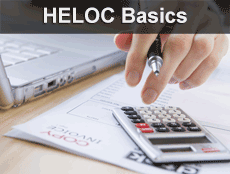 What Is A Home Equity Line Of Credit?
What Is A Home Equity Line Of Credit?
Do you have enough equity in your home to cash out and use it to increase your overall wealth? If you do, be forewarned that this is both an opportunity and a temptation that you could potentially misuse to your financial detriment.
A home equity line of credit or HELOC is a line of credit secured by your real estate. Rather than advancing the full sum of the loan, like a conventional or FHS loan, the lender sets a term and a limit, and you only take out the cash you want to use, up to that limit and within a period typically limited to between 5 and 25 years. HELOCs are home loans that require you to qualify in the same manner as other loans secured by your real estate, and defaulting on your payments could ultimately result in a foreclosure.
The most prudent uses of HELOCs are those big-ticket life-changing items like education and home improvement. This loan format suits these purposes well because of the flexibility; you only borrow as much against your equity as your expenditures mount. Since you are taking away from the stake that you hold in your home, you should only invest it either in bettering yourself or raising the market value of your property.
Mistakes That Homeowners Make With Home Equity Lines Of Credit
Trading in your equity to use for retail purchases or transient experiences is not an efficient financial strategy for the long-term. Case in point, when property values dipped significantly in 2007-2008, overuse of this type of financing for personal spending caused many homeowners to discover that their secured debts were greater than their home values.
In extraordinary circumstances your HELOC could be reduced by a nervous lender before the end of the term and before you can utilize it, which is what happened precisely as the real estate market crumbled in 2008; the banks revoked previously secured lines of credit in response to falling levels of homeowner equity. This drastic pullback was a result of the economic conditions of that era and a drastic measure.
Making Judgment Calls About Opportunities
There are alternatives to HELOCs that might better suit many homeowner circumstances. If you have a large proportion of equity, say fifty percent of the value of your home or more it might prove to be less expensive and simpler to refinance or take a conventional second home loan and take out the equity as a lump sum. However, there is no point in paying interest on cash that you do not intend to put to use immediately. Scooping out the equity that you have accrued in your home with a HELOC is best used as to trade for higher value elsewhere.
As a borrower, you might consider that once your line of credit is exhausted you may then decide to refinance. As the last decade has shown, your home value can go down as well as up. As a sensible homeowner, you should always allow for changes in fortune. However using a HELOC in the short-term to advance your education, career prospects and enhancing your property value are likely to be wise choices in the long-term as well.



About The Author: Kenneth Le
More posts by Kenneth Le